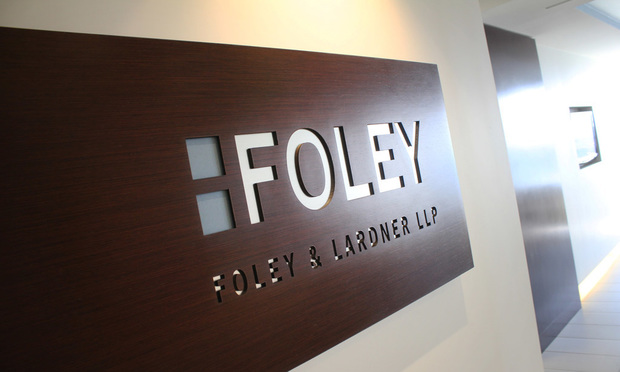Ex-Foley & Lardner Partner Gets 2-Year Suspension for Document Tampering
A onetime Foley & Lardner partner admitted to disciplinary authorities that he backdated and pasted clients' signatures onto documents related to a client's estate.
October 16, 2018 at 04:21 PM
5 minute read
The original version of this story was published on The American Lawyer

The Wisconsin Supreme Court on Tuesday suspended a Milwaukee-based former Foley & Lardner trust and estates partner who admitted to falsifying documents and providing them to an Internal Revenue Service auditor reviewing a client's estate.
With its decision, the Wisconsin high court found that former Foley & Lardner partner Adam Wiensch not only deceived the IRS with falsified and backdated documents, he also caused other lawyers at the law firm to unwittingly rely on those documents. The court handed Wiensch a two-year suspension in light of the conduct.
“Attorney Wiensch deliberately misled the IRS and falsified multiple documents,” the Wisconsin high court wrote. “The deceptions and misrepresentations, both to the IRS and the other attorneys at attorney Wiensch's firm, continued for several years. Attorney Wiensch was an experienced attorney who should have known better.”
The disciplinary action stems from estate planning work that Wiensch, who could not be reached for comment on Tuesday, performed for a husband and wife who owned a private business.
Wiensch set up a trust for the benefit of the couple's children, with the goal of transferring more than $50 million worth of stock in the couple's company to the trust, while also limiting the children's tax burden on that inheritance, the ruling said. When the husband eventually died, Wiensch represented the estate and filed an estate tax return with the IRS, which then opened up an audit investigation to determine whether it should impose gift and estate taxes. The audit continued for several years, and eventually the wife also died and her estate was audited as well.
Responding to inquiries from an IRS lawyer in 2012, Wiensch provided the agency with copies of documents—an installment sale agreement, a collateral pledge agreement and a guaranty of a specific transaction—that he claimed memorialized the terms of the stock sale. Wiensch characterized the documents as having been created at the same time as the stock transfer, but that turned out to be untrue, according to the ruling. The lawyer had backdated the sale agreement and had copied the children's signatures from another document and pasted them onto the guaranty document.
After both the husband and wife had died, the IRS issued a notice that the children owed “multiple millions of dollars” in taxes and penalties in connection with the stock sale. Foley & Lardner then represented the children and, without knowing Wiensch had falsified them, firm lawyers used some of the documents to support an argument for reducing the tax burden. The estate and IRS later reached a settlement, which the Wisconsin Supreme Court wrote was “induced by fraud,” because it was based on the doctored agreements.
Meanwhile, the IRS audit continued and in 2015, Wiensch again backdated and falsified documents. This time they related to whether the wife had designated power of attorney, according to the disciplinary ruling. In this instance, Wiensch copied and pasted the wife's signature onto a pair of doctored power-of-attorney documents, prompting suspicions from the IRS auditor, who asked in July 2016 to interview the children in person.
Around that same time, Foley & Lardner appears to have caught wind of Wiensch's conduct. In Tuesday's ruling, the Wisconsin high court notes that soon after the IRS auditor requested an interview with the children, Foley & Lardner sent a letter to the IRS in August 2016 explaining that Wiensch was no longer with the firm. Foley & Lardner also told the agency that the power-of-attorney documents were not authentic and that there were issues with the stock sale documents. Additionally, the firm reported Wiensch's conduct to the Wisconsin Office of Lawyer Regulation (OLR).
In a statement Tuesday, Foley & Lardner spokeswoman Jill Chanen elaborated on the firm's response.
“We have zero tolerance for actions that violate our core values and the trust our clients place in us,” Chanen said. “Upon becoming aware of irregularities, the firm promptly launched an internal review. It was determined that conduct occurred which needed to be reported to the appropriate authorities and the firm cooperated with them. The partner is no longer affiliated with the firm. We will continue to hold all of our people to the highest standards of professional and ethical conduct.”
Wiensch did not deny any of the conduct for which he was ultimately disciplined. He reached a stipulation with the Wisconsin OLR in which he admitted to 13 counts of rule violations related to the falsifying and backdating of documents.
Although he did not attempt to raise a defense, Wiensch told OLR that his actions coincided with his facing “several highly disruptive and challenging personal issues,” according to the disciplinary ruling. Those struggles included clinical depression that he wasn't able to treat effectively at the time and an “active, uncontrolled” alcohol dependence.
Wiensch has since taken steps to manage both issues, however. The former Foley & Lardner lawyer stopped drinking just after he was confronted with his misconduct and has regularly attended Alcoholics Anonymous meetings since March 2017, the Wisconsin high court wrote.
The two-year suspension takes effect on Nov. 27, according to Tuesday's ruling.
This content has been archived. It is available through our partners, LexisNexis® and Bloomberg Law.
To view this content, please continue to their sites.
Not a Lexis Subscriber?
Subscribe Now
Not a Bloomberg Law Subscriber?
Subscribe Now
NOT FOR REPRINT
© 2025 ALM Global, LLC, All Rights Reserved. Request academic re-use from www.copyright.com. All other uses, submit a request to [email protected]. For more information visit Asset & Logo Licensing.
You Might Like
View All
Landlord Must Pay Prevailing Tenants' $21K Attorney Fees in Commercial Lease Dispute, Appellate Court Rules
4 minute read
State Appellate Court Settles Fee Battle Between Former Co-Counsel in Patent Litigation
5 minute read
Return to Work Mandates Among Current Mental Health Stressors for Legal Professionals
1 minute read
Internal GC Hires Rebounded in '24, but Companies Still Drawn to Outside Candidates
4 minute readTrending Stories
- 1Eliminating Judicial Exceptions: The Promise of the Patent Eligibility Restoration Act
- 2AI in Legal: Disruptive Potential and Practical Realities
- 3One Court’s Opinion on Successfully Bankruptcy Proofing a Borrower
- 4Making the Case for Workflow Automation
- 5Copyright Infringement by Generative AI Tools Under US and UK Law: Common Threads and Contrasting Approaches
Who Got The Work
J. Brugh Lower of Gibbons has entered an appearance for industrial equipment supplier Devco Corporation in a pending trademark infringement lawsuit. The suit, accusing the defendant of selling knock-off Graco products, was filed Dec. 18 in New Jersey District Court by Rivkin Radler on behalf of Graco Inc. and Graco Minnesota. The case, assigned to U.S. District Judge Zahid N. Quraishi, is 3:24-cv-11294, Graco Inc. et al v. Devco Corporation.
Who Got The Work
Rebecca Maller-Stein and Kent A. Yalowitz of Arnold & Porter Kaye Scholer have entered their appearances for Hanaco Venture Capital and its executives, Lior Prosor and David Frankel, in a pending securities lawsuit. The action, filed on Dec. 24 in New York Southern District Court by Zell, Aron & Co. on behalf of Goldeneye Advisors, accuses the defendants of negligently and fraudulently managing the plaintiff's $1 million investment. The case, assigned to U.S. District Judge Vernon S. Broderick, is 1:24-cv-09918, Goldeneye Advisors, LLC v. Hanaco Venture Capital, Ltd. et al.
Who Got The Work
Attorneys from A&O Shearman has stepped in as defense counsel for Toronto-Dominion Bank and other defendants in a pending securities class action. The suit, filed Dec. 11 in New York Southern District Court by Bleichmar Fonti & Auld, accuses the defendants of concealing the bank's 'pervasive' deficiencies in regards to its compliance with the Bank Secrecy Act and the quality of its anti-money laundering controls. The case, assigned to U.S. District Judge Arun Subramanian, is 1:24-cv-09445, Gonzalez v. The Toronto-Dominion Bank et al.
Who Got The Work
Crown Castle International, a Pennsylvania company providing shared communications infrastructure, has turned to Luke D. Wolf of Gordon Rees Scully Mansukhani to fend off a pending breach-of-contract lawsuit. The court action, filed Nov. 25 in Michigan Eastern District Court by Hooper Hathaway PC on behalf of The Town Residences LLC, accuses Crown Castle of failing to transfer approximately $30,000 in utility payments from T-Mobile in breach of a roof-top lease and assignment agreement. The case, assigned to U.S. District Judge Susan K. Declercq, is 2:24-cv-13131, The Town Residences LLC v. T-Mobile US, Inc. et al.
Who Got The Work
Wilfred P. Coronato and Daniel M. Schwartz of McCarter & English have stepped in as defense counsel to Electrolux Home Products Inc. in a pending product liability lawsuit. The court action, filed Nov. 26 in New York Eastern District Court by Poulos Lopiccolo PC and Nagel Rice LLP on behalf of David Stern, alleges that the defendant's refrigerators’ drawers and shelving repeatedly break and fall apart within months after purchase. The case, assigned to U.S. District Judge Joan M. Azrack, is 2:24-cv-08204, Stern v. Electrolux Home Products, Inc.
Featured Firms
Law Offices of Gary Martin Hays & Associates, P.C.
(470) 294-1674
Law Offices of Mark E. Salomone
(857) 444-6468
Smith & Hassler
(713) 739-1250








